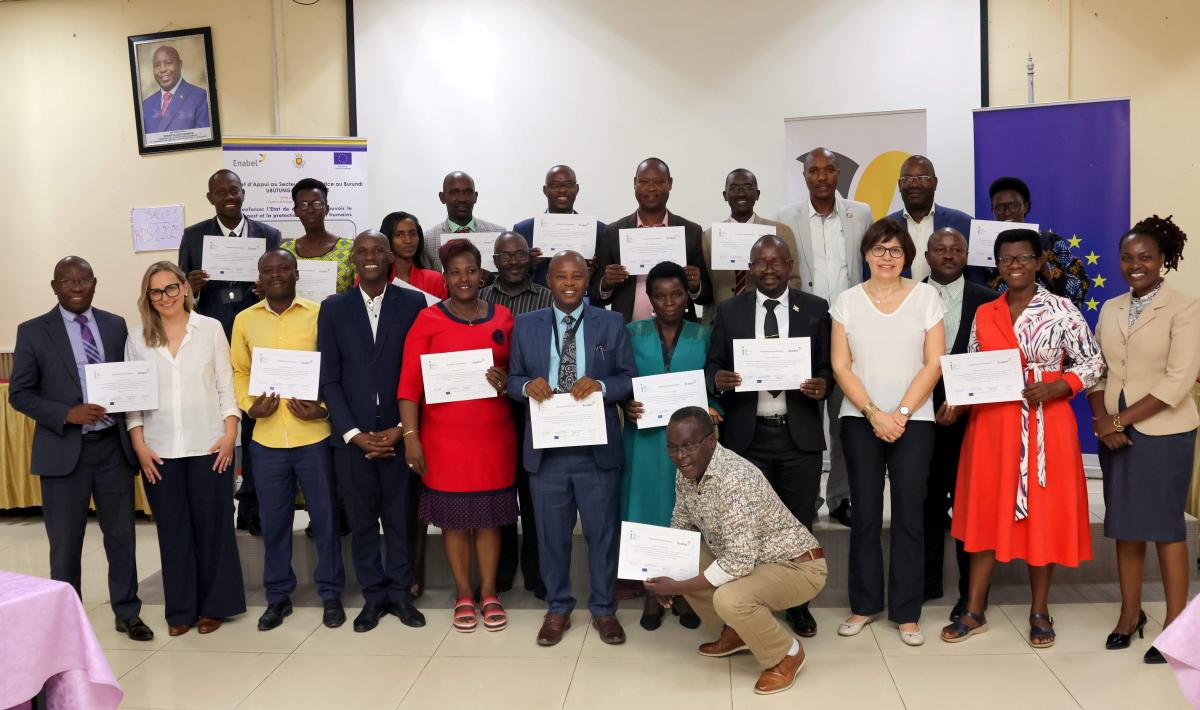Rechercher
Affichage de 135 à 150 sur 3119 actualités
-
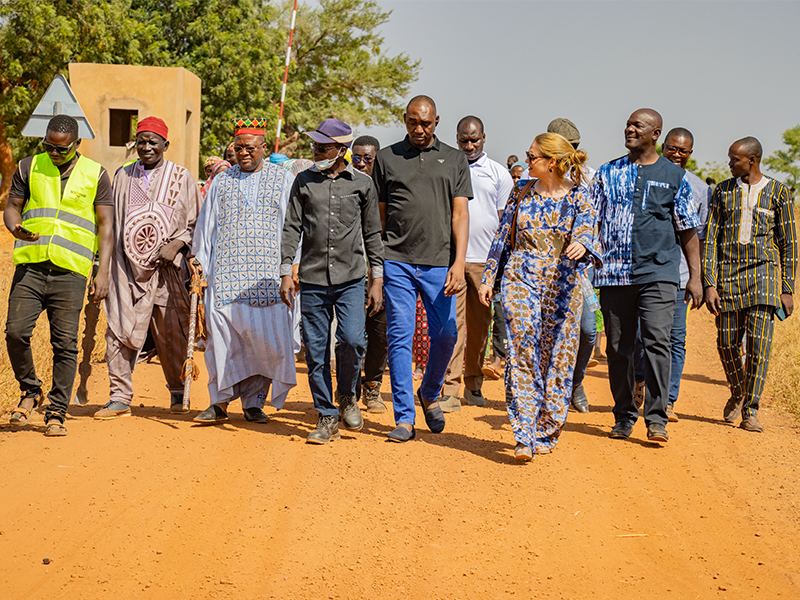
Changer des vies au Burkina Faso : l’impact social d’un projet en pleine évolution
Wendpouiré Julien NANA | 17/11/2025
Dans le cadre du suivi des activités du projet OKD, la Programme Manager d’Enabel, Julie Van der Smissen a effectué une visite terrain le 06 novembre 2025 à Kaya et Boussouma. De la foire des produits forestiers non ligneux (PFNL) à la rencontre avec les autorités locales, en passant par la découverte d’initiatives agricoles intégrées, cette mission a permis de mesurer les effets concrets du projet sur ses cibles directes, notamment les femmes et les personnes déplacées internes.Valorisation des PFNL : entre qualité, hygiène et entrepreneuriat fémininLa journée a débuté par la visite de la foire des produits forestiers non ligneux, où plusieurs coopératives ont exposé leurs produits : moringa, arachides, pains de singe, entre autres. (Cette foire a été organisée avec le financement d’Enabel afin de mettre en lumières les entreprises qu’elle accompagne et de leur faciliter l’accès aux marchés). Les visiteurs ont pu par ailleurs constater la qualité des produits, mais aussi l’effort mis dans le conditionnement et le marketing. Ces éléments contribuent non seulement à la valorisation des produits, mais aussi à leur meilleure conservation et à leur conformité aux normes d’hygiène.Lors de la cérémonie d’ouverture, plusieurs coopératives dirigées par des femmes ont été dotées en équipements. Une initiative saluée, par Rasmata GANGO, transformatrice de balanites en huile et en savon qui a reçu un tricycle, un frigo, une glacière, etc. Pour elle, cet équipement répond à un besoin qu’elle a exprimé dans le but d’améliorer son activité. « En tant que déplacée interne, je n’avais plus d’équipement pour mes activités et cela vient comme un ouf de soulagement. Nous disons vraiment merci. » dit-elle. L’accompagnement par des coachs et l’accès facilité au crédit ont également été soulignés comme des leviers essentiels pour renforcer la confiance des bénéficiaires et structurer leurs ambitions.Une ferme modèle au service de l’inclusionLa délégation s’est ensuite rendue dans la ferme Happy Breeder, une ferme intégrée combinant agriculture, maraîchage, pisciculture et élevage. Ce modèle économique innovant offre des opportunités d’emploi à des femmes déplacées internes, tout en favorisant leur insertion sociale. Grâce au projet, la ferme a pu investir dans des infrastructures de conservation, notamment pour le riz, et améliorer son système d’irrigation. Elle sert également de centre de formation et de stage pour les jeunes et les femmes.Désenclavement et développement localLa visite s’est poursuivie à la mairie de Boussouma, où les échanges ont porté sur les priorités locales en matière de développement. L’équipe d’Enabel accompagnée, de la Délégation spéciale de Boussouma, s’est rendue sur une piste rurale. Cette piste a été financée par le projet OKD, pour désenclaver des zones agricoles et d’élevage. Ces infrastructures facilitent non seulement l’accès aux marchés, mais ont aussi un impact social fort : les femmes témoignent déjà d’une amélioration significative du transport en cas d’accouchement, réduisant ainsi les risques liés aux complications. Le premier vice-président de la délégation spéciale de Boussouma, Sonkogl Naaba Saaga a souligné l’importance de cette piste pour la commune. « Depuis que nous sommes là, vous avez vu des charrettes, des tricycles emprunter la piste. Tout ça, c’est pour évacuer les récoltes, parce que cette zone constitue un grenier pour nous, tant sur le plan agricole qu’en matière d’élevage. » a-t-il indiqué. Un autre aspect marquant du projet est l’implication directe des femmes dans la réalisation des pistes. Formées aux techniques de construction et d’entretien, elles ont non seulement perçu des revenus, mais ont aussi constitué une épargne pour développer des activités génératrices de revenus. Ce processus a renforcé leur confiance en elles et modifié positivement le regard de la communauté sur leur rôle dans le développement local. À l’issue de la visite, Julie Van der Smissen pense que ce projet OKD, démontre ses résultats. « On voit que non seulement il y a de l'activité économique qui se crée, que cela crée par ricochet de l'emploi et que les bénéfices sont réinvestis, mais aussi que cette activité économique est souvent tournée vers la souveraineté alimentaire » a -telle souligné. Elle a également affirmé que le projet : « renforce aussi la cohésion sociale et il y a énormément de bénéfices sociaux au-delà des bénéfices économiques ». C’est pourquoi, la Programme Manager a estimé pouvoir, « dire que le projet est un succès et on peut être assez fiers de l'idée de ce projet ». Alors que le projet OKD poursuit sa mise en œuvre, ses effets sur les communautés locales, notamment les femmes et les personnes vulnérables, sont déjà visibles et significatifs. En associant innovation, inclusion et développement durable, il illustre la capacité des projets de coopération à transformer durablement les territoires. Et à mi-parcours, les résultats laissent présager un impact encore plus grand pour les années à venir.
-
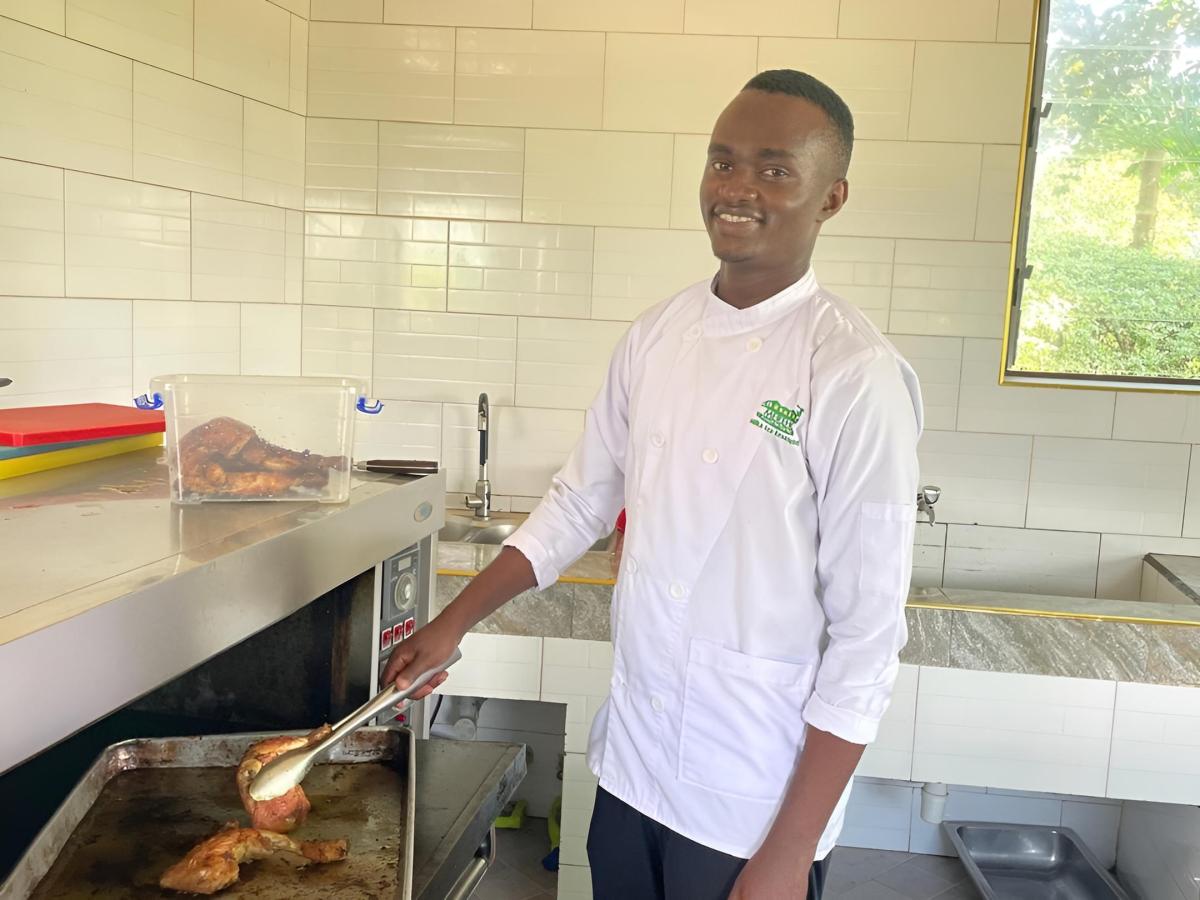
Two youths from Uganda find hope in a kitchen
Jovia KAVULU | 14/11/2025
When Harriet Katusabe and Donasiye Ndayishimiye heard about Enabel’s Work Readiness Programme early this year through their friends, they didn’t know it would mark the beginning of a new chapter in their lives. Both had completed their studies but were struggling to find meaningful employment. Donasiye, commonly known as Don had just finished his certificate course in ICT, while Harriet had trained in catering, but they lacked real workplace experience. The opportunity to apply online for a programme that connects young people to private-sector employers felt like a lifeline. They applied, were called for a short pre-placement training, and soon after, they were invited to Mika Eco resort Hotel in Hoima for a six-month placement. For the first time, they were stepping into a professional kitchen where theory met practice. Harriet joined the main kitchen, while Don was placed in the poolside section. Their first days were filled with excitement and adjustment as they learned to handle the fast-paced rhythm of hotel work. “At school, we used to cook small portions,” Harriet recalls with a smile. “But here, I’ve learned to prepare food for more than a hundred people a day. It’s busy, but I’ve gained so much experience.” At Mika, Harriet’s duties range from buffet preparation during large bookings to assisting with breakfast and dinner service. She has learned to manage morning and evening shifts, coordinate with senior chefs and plan meals efficiently. Don’s work is equally dynamic. At the poolside kitchen, he handles fast foods— preparing ingredients in advance for smooth service. “We prepare rice, fish and other dishes so that when orders come, we can serve quickly,” he says. Through the placement, Don has learned to prepare both local and international cuisines, including Chinese, Indian and other continental dishes. “I joined because I wanted to gain more skills,” he adds. “Now I can cook different foods and work confidently in a kitchen.” The Head Chef at Mika Hotel, David Muramuzi speaks proudly of the duo’s performance. “They are good people,” he said. “Both Don and Harriet work in the kitchen, and they have shown great potential. We could see that they came ready for work — good attitude, disciplined and willing to learn. That is very important in this profession.” He explained that they were retained because of their strong work ethic. “You can see the potential in them. In five years, they will be very strong professionals,” he remarked confidently. Harriet and Don say the experience has taught them teamwork, communication and time management. They have also learned pastry and bakery skills, which Harriet plans to build on in the future. “I’ve learned to bake cakes and make pastries,” she says. “I want to open my own bakery one day.” Don hopes to start a small food business once he saves enough money, though he admits that finances are his biggest challenge for now. Both agree that the Work Readiness Programme has changed their lives. It has given them a chance to gain experience, develop professional habits and set future goals. Harriet and Don encourage other young people to apply for the programme. “We are lucky,” they say. “This programme gave us a chance to work, learn and dream again.” Enabel implements the Work Readiness Programme under the WeWork project, which aims to create green and decent jobs for youth in Uganda. The programme is a continuation of the Skills, Attitude, Governance and Anti-Corruption project, which transitioned over 1,000 young people into employment before it closed last year. Because of its success, the Work Readiness Programme was integrated into the WeWork project. The Work Readiness Programme equips young people with essential soft skills, connects them to private employers for hands-on training and ensures their transition into decent and productive employment.
-

Tap & Track: Digitising, professionalising and greening drinking water services in Uganda
Alice BONJEAN | 13/11/2025
Access to safe drinking water remains a challenge in many parts of Uganda. To address this, Practica and GOAL Uganda have joined forces to roll out Tap & Track, an innovative system designed to transform water service delivery. Also known as the Water System Asset Management toolbox, this solution aims to digitalise, professionalise and green drinking water services for selected Area Service Providers and Umbrella Water & Sanitation Organisations. What is Tap & Track ?Tap & Track is a digital application that helps optimise the financial and technical performance of drinking water systems. Beyond efficiency, the system promotes environmentally friendly operations and empowers young and female water point caretakers, ensuring inclusivity in the water sector. This initiative builds on the longstanding partnership between Practica and GOAL Uganda, which previously introduced the TokenTap, a prepaid handpump solution. Together, these innovations are expected to deliver sustainable operation and maintenance of water systems, benefitting the wider WASH (Water, Sanitation and Hygiene) sector.The role of Enabel Innovation HubThe project, running from January 2025 to February 2026, is supported by the EU-funded programme Digital and Green Innovation (DGI) which launched in 2024 a grant on Scaling Digital and Green Innovations implemented by Enabel. Through its Innovation Hub, Enabel provides critical support for scaling (up) promising innovations and solutions like Tap & Track, enabling them to reach more communities and create lasting impact. Why it matters ?By combining digital tools with green practices, Tap & Track addresses key challenges in water service delivery: Improved reliability of water systems ; Enhanced financial sustainability for service providers ; Reduced environmental footprint ; Greater inclusion of women and youth in water management. This project represents a significant step towards safe, sustainable and equitable water access in Uganda and sets the stage for similar innovations across the Global South.
-
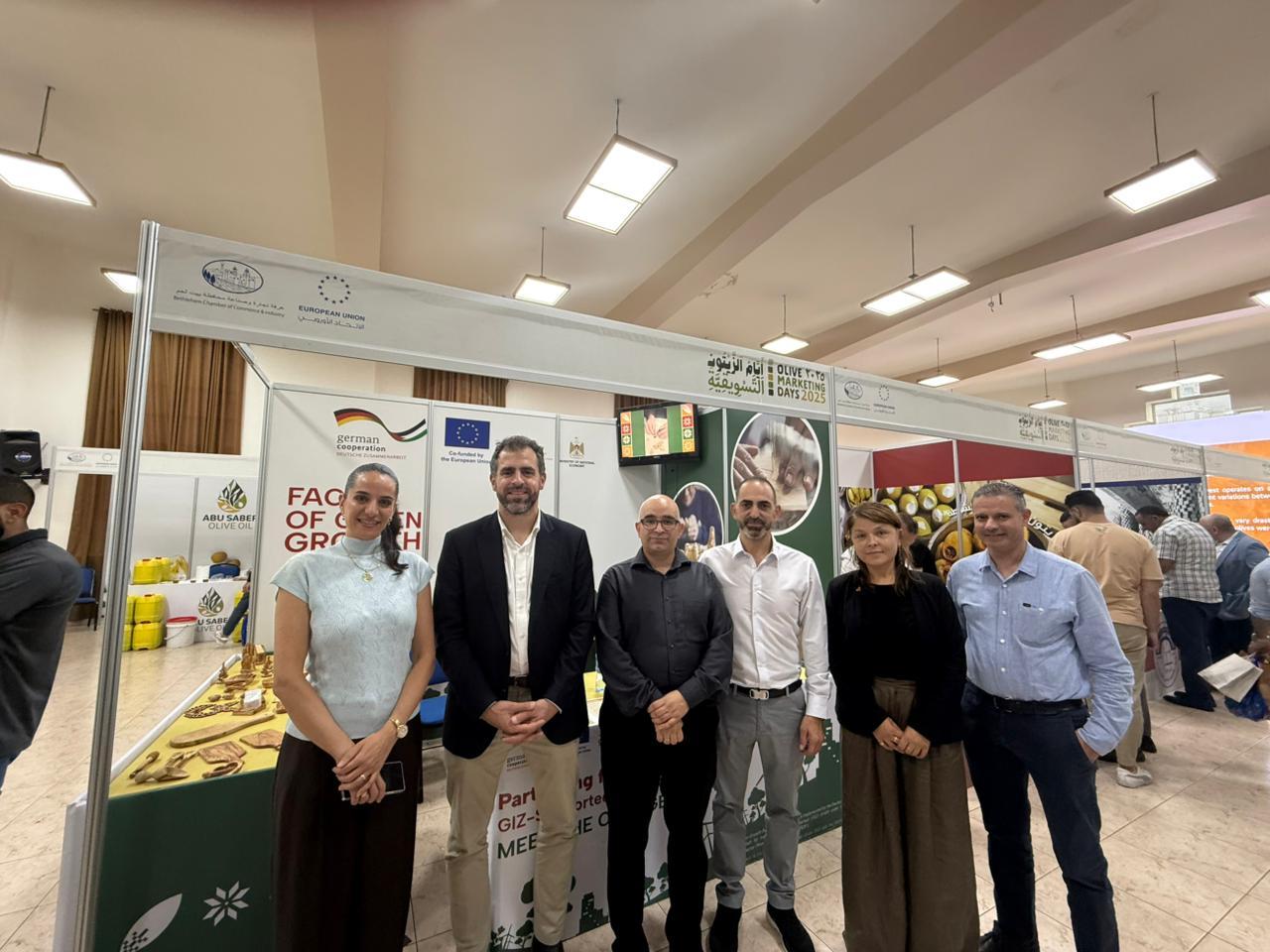
Enabel Participates in the Olive Marketing Days Exhibit
Mazen NAIM | 13/11/2025
The Belgian Agency for International Cooperation (Enabel) participated in the Olive Marketing Days in Beit Jala, as part of its efforts to strengthen the resilience of the Palestinian economy and open export opportunities for Palestinian products to European countries. This event, held in cooperation with the Bethlehem Chamber of Commerce and Industry and funded by the European Union, showcased a distinguished range of olive-based products, which form a cornerstone of the Palestinian economy and support thousands of Palestinian families. Through this initiative, we continue to support local farmers and factory owners, enabling them to access new markets and enhancing the international standing of Palestinian products.
-
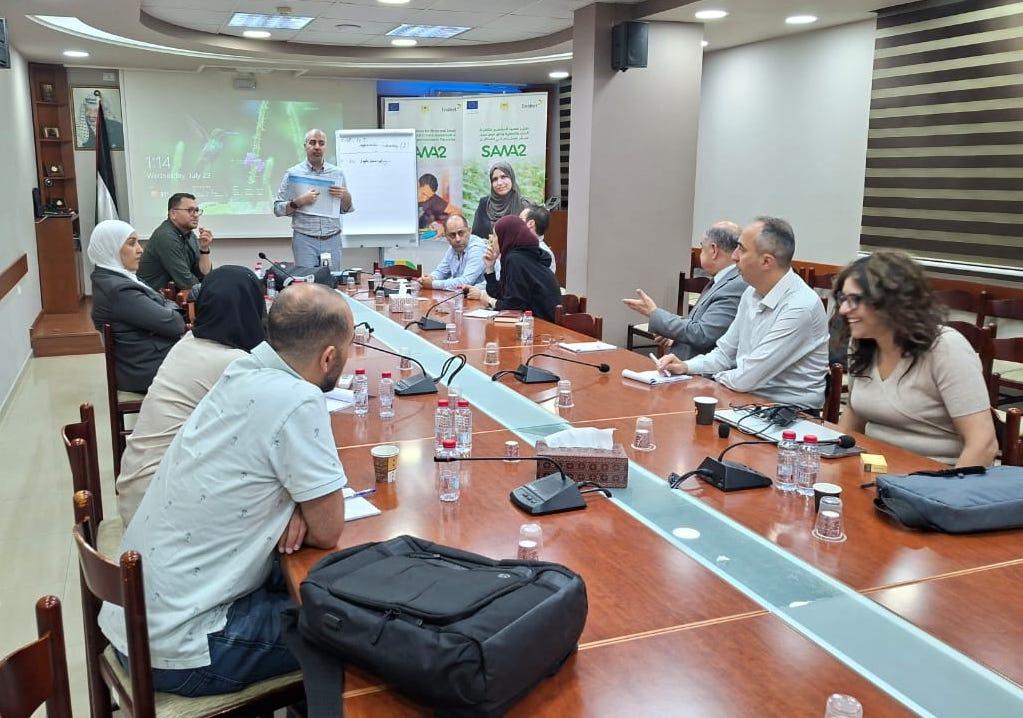
Capacity Self-Assessment Workshop for PFI - Enabel Partner
Mazen NAIM | 13/11/2025
Under the project "Enhance Resilience of Micro and Small Businesses and Create Sustainable Livelihood Opportunities in Palestine – SAWA II", the Belgian Agency for International Cooperation (Enabel), in partnership with the European Union and the Palestinian Federation of Industries (PFI), held a workshop in Ramallah titled "Self-Capacity Assessment Workshop." The workshop was attended by representatives from the European Union, Enabel, the Director and members of the PFI Board of Directors, and the Secretary-General and Executive Directors of specialized industrial federations. The workshop aimed to analyze the current capacities and resources available to the PFI and its various members. Discussions also addressed the most prominent skills and capabilities needed by the Federation and the industrial sector in relation to the green and circular economy and business development services. It is worth noting that the "Sawa II" project is funded by the European Union and implemented by Enabel. It spans three years with a budget of €6 million and targets hundreds of young people and women who own micro and small enterprises, in addition to creating a supportive environment for the green and circular economy.
-

Des centres de formation modernisés pour répondre aux défis du marché burkinabè
Geoffroy ZONGO | 12/11/2025
Dans le cadre du programme de coopération bilatérale entre le Burkina Faso et le Royaume de Belgique, une mission conduite par Enabel a sillonné les établissements de formation professionnelle publics de la région du Nakambé (ex-Centre-Est). L’objectif est d’affiner, l’état des besoins en équipements aussi bien informatique que spécifique exprimés par les partenaires de l’enseignement technique et de la formation professionnelle.Du 28 au 30 octobre 2025, une équipe de l’Agence belge de coopération international (Enabel), piloté par Maimouna SAWADOGO, chargée de projet digitalisation et innovation a effectué une tournée dans plusieurs établissements de formation professionnelle de la région du Nakambé (ex-Centre-Est). Cette mission s’inscrit dans une dynamique de modernisation et de renforcement des capacités de l’enseignement et de la formation technique et professionnelle (EFTP) en réponse aux défis posés par la transformation numérique et l’évolution rapide des métiers.Les visites ont concerné cinq établissements clés : le Lycée Professionnel de Niaogho, le Collège d’enseignement Technique et de Formation Professionnelle (CETFP) du Boulgou, le CETFP Princesse Yennenga, le Lycée Professionnel Régional de Tenkodogo et le Lycée Professionnel Naaba Zanré de Koupèla. À chaque étape, les échanges avec les responsables ont permis de dresser un tableau précis de l’existant : salles de formation, équipements informatiques et spécifiques, logiciels utilisés, ainsi que les modes de fonctionnement.Les constats sont convergents. Les équipements sont souvent obsolètes ou insuffisants et les infrastructures nécessitent des travaux de réhabilitation et de maintenance. Les outils pédagogiques, qu’ils soient numériques ou techniques, doivent être actualisés. Une mise à jour de ces outils contribuera à améliorer la qualité de l’apprentissage et par ricochet, la compétitivité des jeunes. La mission a également recueilli les besoins spécifiques de chaque centre sous forme de listes budgétisées, détaillées et priorisées en vue de les prendre en charge selon les ressources disponibles. Enabel, à travers cette initiative, réaffirme son engagement à soutenir la résilience socio-économique du Burkina Faso. Le renforcement des capacités opérationnelles et matérielles des centres de formation professionnelle est un levier stratégique pour répondre aux exigences du marché du travail et offrir aux jeunes une formation de qualité, adaptée aux réalités locales et aux avancées technologiques.
-
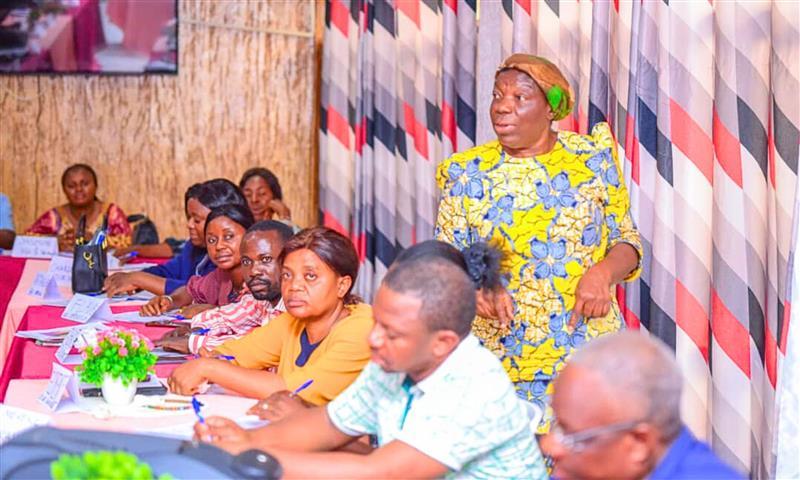
Des prestataires formés pour améliorer la prise en charge des survivant·e·s de VBG à Mbuji-Mayi
Paola VANGU TSAKALA | 12/11/2025
Clôturée le samedi 1er novembre 2025 à l'hôtel Le Château d'Or à Mbuji-Mayi, une formation de six jours a réuni 26 prestataires de santé issus de 12 zones de santé urbaines et rurales du Kasaï Oriental. Organisée avec l'appui technique de la Division Provinciale de la Santé à travers les programmes spécialisés PNSA, PNSR et le CISM (Centre Intégré des Services Multisectoriels) de la zone de santé de Dibindi, et le soutien financier du projet LVSI d'Enabel, cette session visait à renforcer les capacités sur la prise en charge médicale des survivant·e·s de violences basées sur le genre (VBG) et à promouvoir les droits à la santé sexuelle et reproductive des jeunes et adolescents·e·s. Les prestataires formés appliqueront désormais les protocoles actualisés dans leurs structures respectives afin d'assurer un meilleur accueil, une prise en charge intégrée et un suivi de qualité. La Division provinciale de la Santé (DPS), en collaboration avec ses programmes spécialisés, la Division du Genre et le projet LVSI de Enabel, prévoit des supervisions conjointes ainsi que des renforcements complémentaires pour garantir la pérennité et la qualité des services fournis aux populations de Mbuji Mayi et ses environs. Doudou Kajangu
-

À l’école, la prévention des VBG s’organise avec et par les élèves
Paola VANGU TSAKALA | 12/11/2025
Dans le cadre des efforts de prévention des Violences Basées sur le Genre (VBG) en milieu scolaire, une rencontre a été organisée à Kinshasa, dans la zone éducative du Mont-Amba, au bénéfice de dix nouvelles écoles membres de l’ASSONEPA (Association Nationale des Écoles Privées Agréées), avec l’appui du projet LVSI (Lutte contre les Violences Sexuelles et l’Impunité) implémenté par Enabel. Cette initiative vise à impliquer directement les élèves et les enseignants dans la mise en place de mécanismes durables pour détecter, prévenir et gérer les cas de VBG au sein des établissements scolaires.Clubs Genre et mécanismes de gestion des plaintes opérationnelles En plus de la mise en place des clubs, l'atelier a permis de 36 anciens membres d'écoles à la gestion des plaintes, afin de garantir un mécanisme d'écoute, de signalisation et de traitement des cas de violences. À l'issue de cette activité, les 10 nouvelles écoles ciblées bénéficient désormais chacune d'un Club Genre actif et d'un Mécanisme de Gestion des Plaintes (MGP). Ces outils offrent un cadre sûr aux élèves pour dénoncer les abus et promouvoir des comportements responsables au sein de la communauté scolaire.Doudou Kajangu
-

Former pour mieux juger : un atelier national renforce la lutte contre les VBG en RDC
Paola VANGU TSAKALA | 12/11/2025
Un besoin exprimé sur le terrain À la suite des sessions de formation sur la déontologie professionnelle et le traitement des affaires liées aux violences basées sur le genre (VBG) organisées l'année dernière dans les provinces du Kasaï-Oriental, du Sud-Ubangi, de la Tshopo et de Kinshasa, plusieurs magistrats et auxiliaires de justice avaient exprimé un besoin de renforcement de capacités. Ils souhaitaient être mieux outillés pour faire face à la complexité croissante des infractions liées aux VBG, en particulier les violences sexuelles. Face à cette demande, le Conseil Supérieur de la Magistrature (CSM), avec l'appui d'Enabel à travers son projet Lutte contre les Violences Sexuelles et l'Impunité (LVSI), a élaboré un module enrichi de formation sur les VBG, avec pour ambition de le diffuser largement à travers les ressorts judiciaires du pays. Un atelier stratégique à Mbanza-NgunguC'est dans ce contexte qu'un atelier de formation des formateurs s'est tenu à Mbanza-Ngungu, du 2 au 9 novembre 2025. Il a réuni un groupe de magistrats civils et militaires sélectionnés pour leur expertise et leur engagement dans les différentes provinces d'intervention du projet LVSI. L'objectif était de leur transmettre à la fois les contenus du nouveau module validés et les compétences pédagogiques nécessaires pour animer à leur tour des sessions de formation à l'échelle nationale. L'atelier a permis de constituer un vivier de formateurs qualifiés, capables de relayer la formation dans leurs juridictions respectives et de contribuer à la réduction de l'impunité en matière de VBG. Grâce au guide du formateur produit préalablement, les participants ont acquis des outils concrets pour mieux comprendre, enseigner et traiter les affaires de VBG. Le rapport final de l'atelier a été validé, marquant une étape clé dans la stratégie nationale de formation continue du CSM. Un impact durable sur toute la chaîne de justiceCette initiative fait partie d'une stratégie globale de lutte contre les violences basée sur le genre. Elle vise à former, à terme, les magistrats, les officiers de police judiciaire, les professionnels de santé, les auxiliaires de justice et les acteurs de la société civile. En renforçant les compétences dès le départ, cet atelier aide à mieux protéger les victimes et à rendre la justice plus attentive aux questions de genre, conformément aux besoins exprimés sur le terrain et aux engagements pris par la RDC. Doudou Kajangu
-
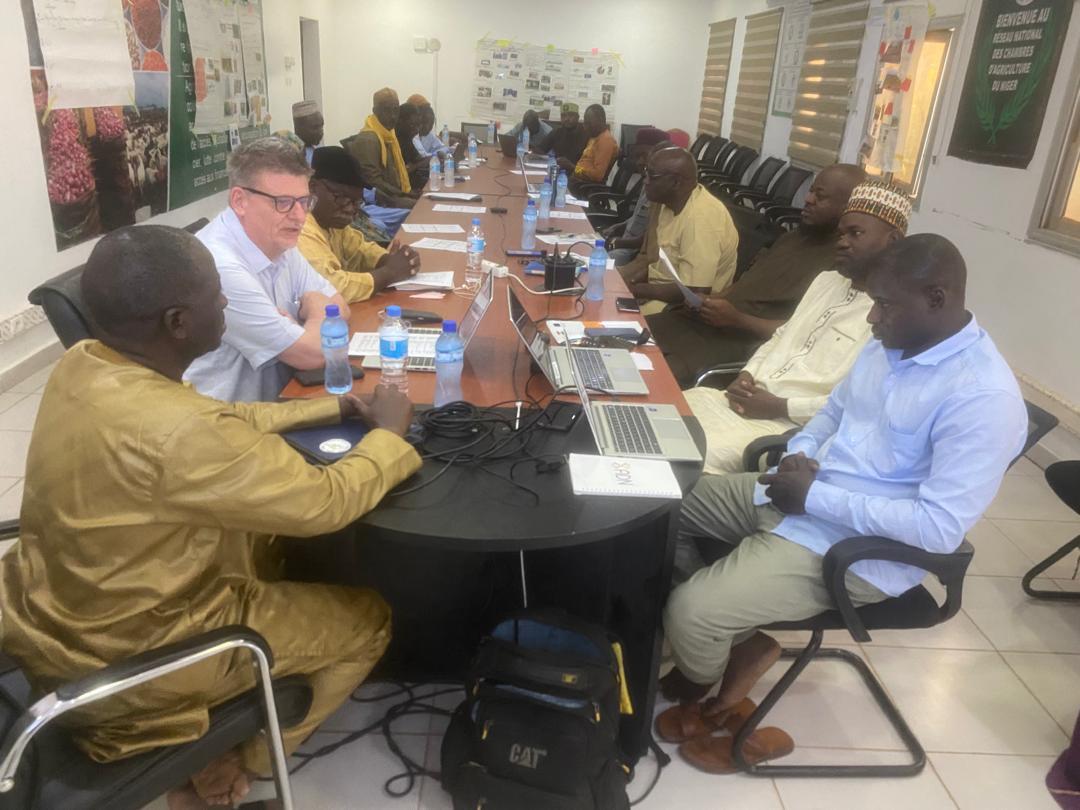
Au Niger, Enabel appuie la digitalisation des services d’appui-conseil en élevage.
Halissa HASSAN DAN AZOUMI | 11/11/2025
La salle de réunion du Réseau National des Chambres d’Agriculture du Niger (RECA) a abrité, du 5 au 7 novembre 2025, l’atelier de capitalisation de la convention de subside RECA / REEL Mahita/Enabel.Cette rencontre a permis de faire le point sur les résultats obtenus dans le cadre de ce partenariat, qui a contribué de manière significative à la modernisation du conseil agricole et pastoral au Niger. Grâce à l’appui du projet REEL Mahita, financé par Eanbel, le RECA a mis en place un système digital d’appui-conseil en élevage facilitant l’accès à des informations et conseils pratiques pour 2 691 producteurs et productrices actifs dans les chaînes de valeur lait, aviculture et bétail-viande. Parmi les principales réalisations figurent : La production de 28 fiches techniques de conseil en élevage disponibles sur le site web du RECA ; la diffusion de 70 émissions radio sur les thématiques liées aux filières cibles ; la production de 174 notes vocales en langues locales pour un meilleur accès à l’information; et la conception d’une application mobile gratuite, RECAEL, téléchargeable sur Playstore, offrant un accompagnement numérique de proximitéCes résultats témoignent de l’impact concret de l’appui du projet REEL Mahita, mis en œuvre par Enabel avec l’appui du Royaume de Belgique, en faveur de la digitalisation des services de conseil agricole et de la professionnalisation des acteurs du secteur de l’élevage au Niger.
-
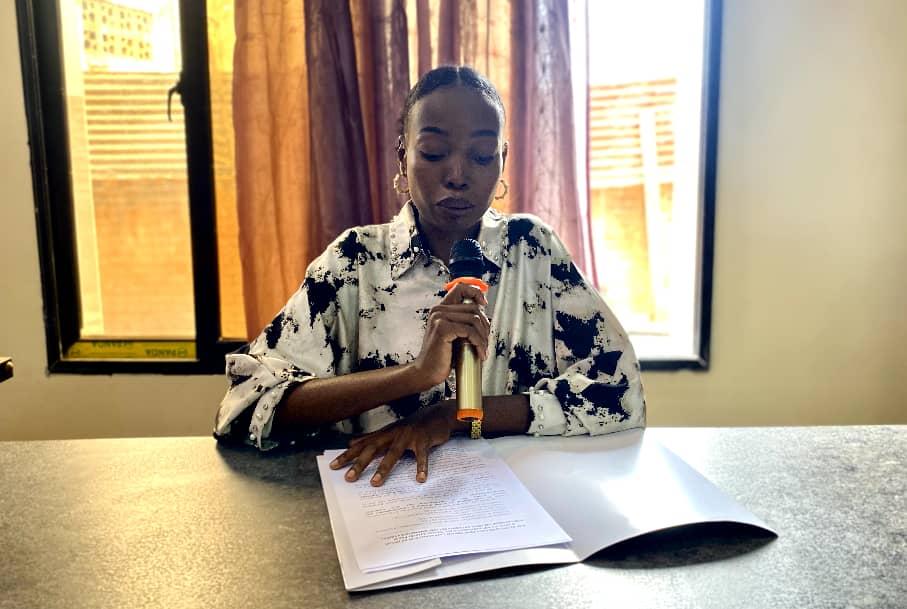
Renforcement de l’alphabétisation et du leadership féminin en milieu rural
Paola VANGU TSAKALA | 10/11/2025
Le projet d’appui à l’alphabétisation et au développement du leadership féminin ont été officiellement lancé le 07 octobre 2025 à Mbujimayi (Kasaï Oriental) et le 22 octobre 2025 à Kabinda (Lomami), avec un objectif commun: Renforcer les capacités des populations rurales, en particulier les ménages agricoles vulnérables et les organisations paysannes de base, avec une attention particulière portée à l’autonomisation des femmes.L’alphabétisation, un levier essentiel pour l’autonomie et le leadership féminin au sein des communautésPour un accès facile à l’information, une meilleure participation à la vie communautaire et une gestion efficace des activités génératrices de revenus, de nouveaux espaces d’apprentissage ont été établis afin de permettre aux femmes rurales d’acquérir des compétences de base en lecture, écriture et calcul dans plusieurs localités.En parallèle, des formations dédiées au leadership féminin ont été lancées pour encourager les femmes à prendre davantage de responsabilités au sein des organisations paysannes et des instances locales. Ces sessions renforcent la confiance en soi, les capacités de prise de décision, ainsi que les compétences en gestion et en communication.Un impact sur 1 500 femmes ruralesAu terme de cette initiative visant à renforcer la résilience des communautés rurales tout en promouvant l’égalité de genre, 1 500 femmes rurales ciblées, soit 750 par province, auront consolidé leurs compétences, retrouvé leur autonomie et seront mieux équipées pour contribuer activement au développement socio-économique local.Ces actions sont déployées en partenariat avec HPP-Congo dans le Kasaï-Oriental et la Commission Justice Paix et Sauvegarde de la Création de l’ECC (ECC/JPSC) dans la province de la Lomami. Elles s’inscrivent dans le cadre du projet Agriculture d’Enabel afin d’accompagner la professionnalisation agricole et l’autonomisation des acteurs ruraux dans la région.
-
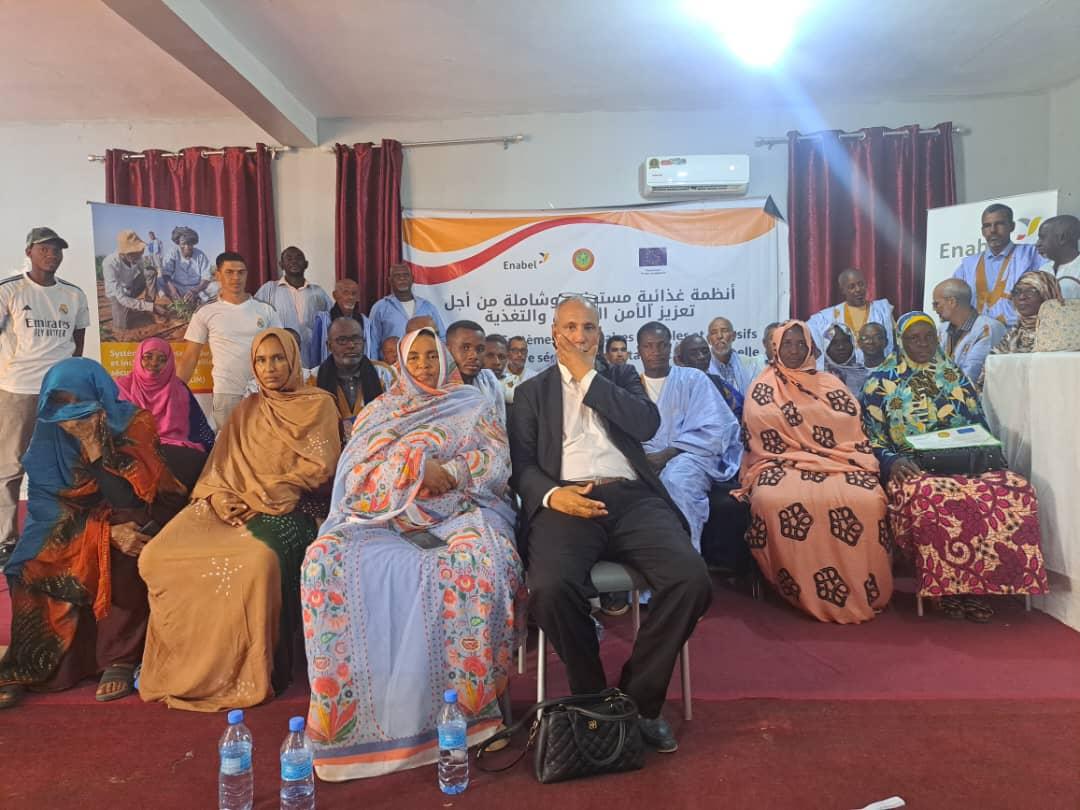
En Mauritanie: un pas vers des systèmes alimentaires plus durables
Aminata KANE | 05/11/2025
Redynamiser la filière maraîchage en Assaba Dans le cadre du projet SYSALIM – Systèmes alimentaires durables et inclusifs pour une meilleure sécurité alimentaire et nutritionnelle, un atelier de redynamisation du cadre de concertation régional de la filière maraîchage s’est tenu en Assaba. Cette initiative vise à relancer le dialogue entre les acteurs clés de la chaîne de valeur maraîchère – producteurs, commerçants, services techniques et partenaires – afin de renforcer la coordination, améliorer la valorisation des productions locales et réduire les pertes post-récolte.Le projet SYSALIM, financé par l’Union européenne et mis en œuvre par Enabel, s’inscrit dans la continuité des appuis apportés à travers les projets RIMDIR, RIMFIL et SECURALIM. Ces programmes ont permis de structurer les producteurs et de mettre en place un dispositif de conseil de proximité, tout en soutenant un développement rural inclusif et respectueux de l’environnement.L’atelier a permis aux participants de comprendre le rôle et les avantages d’un cadre de concertation (CC), de valider un règlement intérieur, d’élire un bureau de gestion et d’élaborer un plan d’action concret pour dynamiser la filière.En revitalisant ces espaces de dialogue, le projet SYSALIM contribue à bâtir des chaînes de valeur plus inclusives, durables et porteuses d’opportunités économiques, notamment pour les femmes et les jeunes ruraux.
-
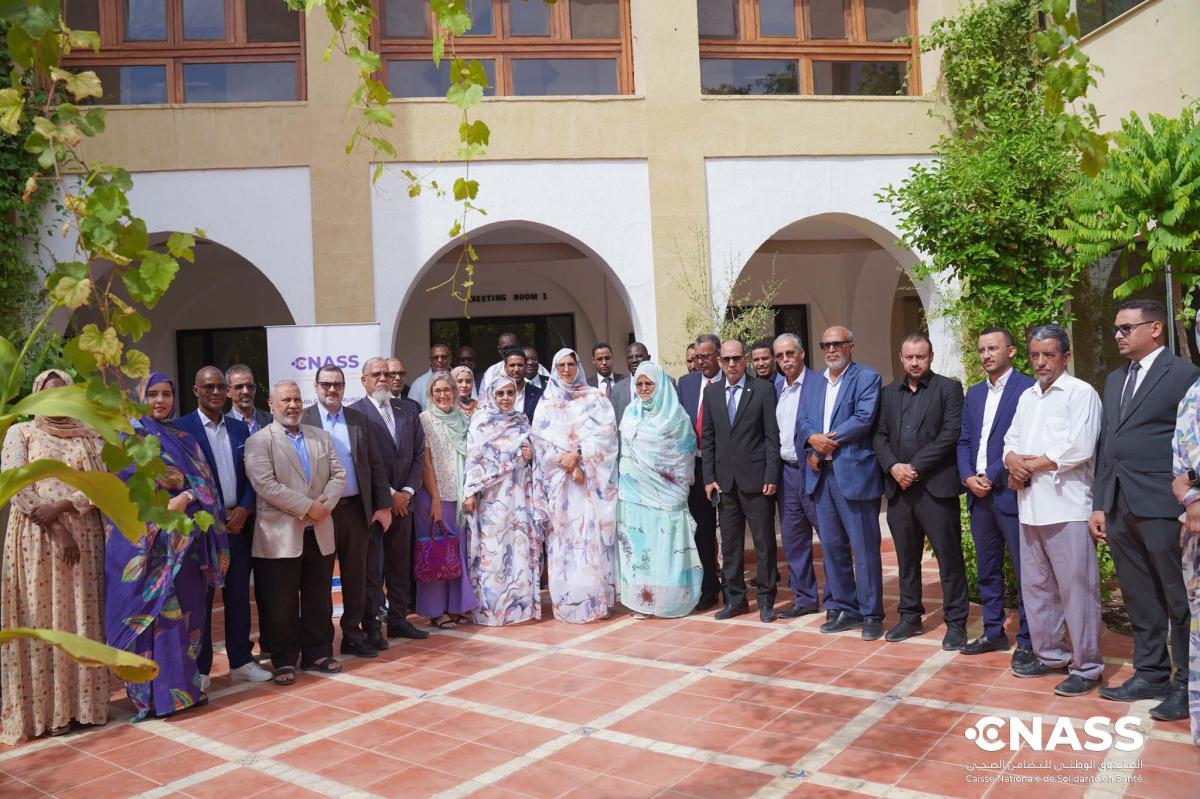
Vers une couverture sanitaire universelle en Mauritanie
Aminata KANE | 05/11/2025
La CNASS renforce les capacités de ses cadres avec l’appui du projet AIPASS La Caisse Nationale de Solidarité en Santé (CNASS) a lancé, à Nouakchott, un atelier stratégique réunissant les Directeurs Régionaux de la Santé et les Directeurs d’Hôpitaux autour de trois thématiques majeures : (1) la couverture sanitaire universelle, (2) le financement durable de la santé et (3) le système d’assurance maladie.Organisé en collaboration avec le ministère de la Santé, cet atelier s’inscrit dans le cadre du projet AIPASS, financé par l’Union européenne et mis en œuvre par Enabel. Le projet accompagne la CNASS dans le renforcement de ses capacités institutionnelles et la mise en œuvre progressive de l’assurance maladie pour tous.Dans son allocution d’ouverture, la Directrice générale de la CNASS, Madame Amal Cheikh Abdallahi, a souligné l’importance d’harmoniser les approches entre les structures sanitaires afin d’améliorer la qualité des services rendus aux citoyens. Elle a salué le rôle des partenaires techniques et financiers dans ce processus, tout particulièrement celui du projet AIPASS.La Secrétaire générale du ministère de la Santé, Madame Alia Menkouss, a, quant à elle, salué l’initiative et rappelé que le succès de la couverture sanitaire universelle repose sur une coordination efficace entre les acteurs nationaux et leurs partenaires.En favorisant le partage d’expériences et la montée en compétence des responsables régionaux, cet atelier constitue une étape clé vers un système de santé plus équitable, solidaire et durable en Mauritanie.
-
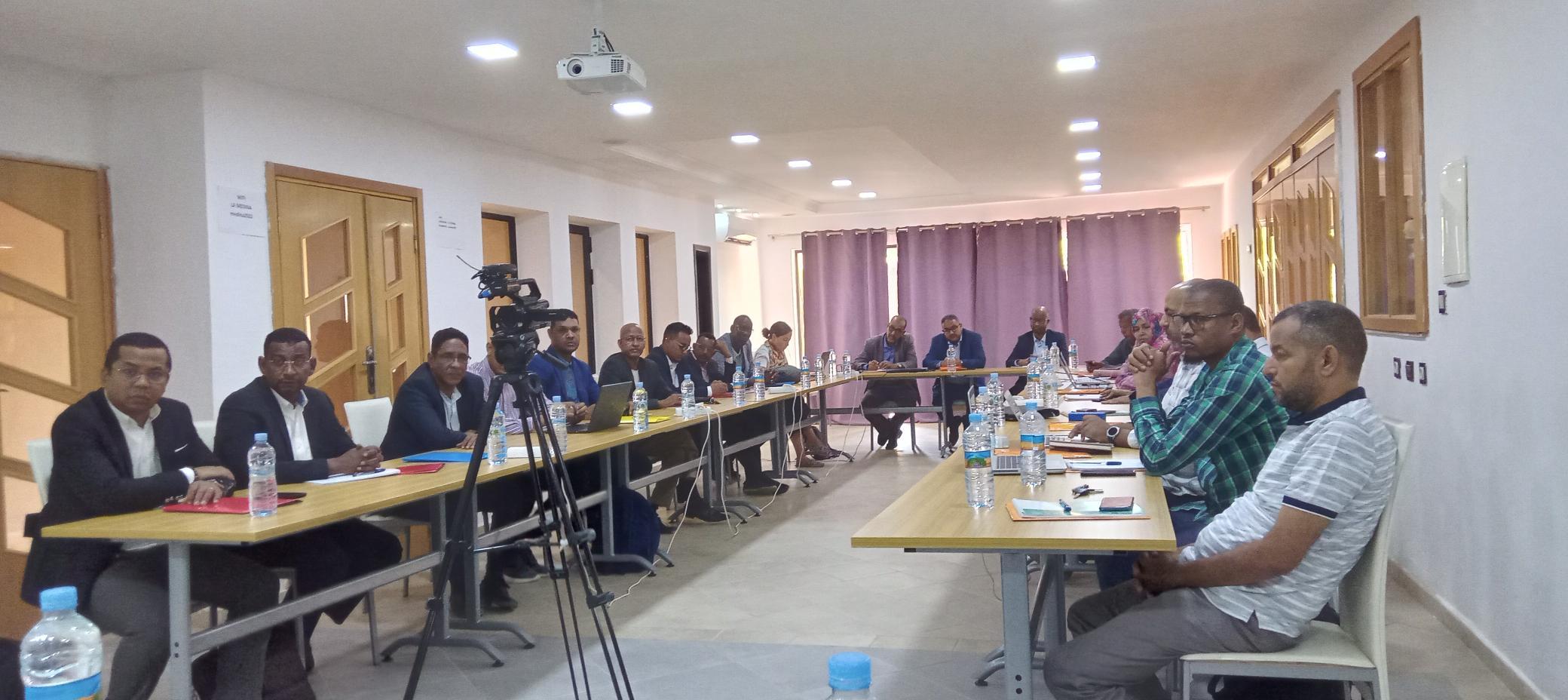
Mauritanie : des experts formés pour évaluer les appels d’offres et contribuer à une meilleure disponibilité des médicaments essentiels à la population
Aminata KANE | 05/11/2025
Atelier de formation des évaluateurs de l’Appel d’Offre International de Préqualification Garantir à chaque Mauritanien un accès durable à des médicaments de qualité, sûrs et abordables, tel est l’un des défis majeurs du système de santé. Consciente de cette mission essentielle, la Centrale d’Achat de Médicaments, Équipements et Consommables Médicaux (CAMEC) bénéficie depuis 2024 de l’appui technique et stratégique du projet AI PASS, financé par l’Union européenne et mis en œuvre par Enabel.Ensemble, ils ont franchi une étape importante avec l’élaboration du premier Plan Stratégique de Développement (PSD) 2024-2028 de la CAMEC. Ce plan vise notamment à moderniser les procédures de passation des marchés afin de garantir la disponibilité d’intrants de santé de qualité et à coût maîtrisé pour la population mauritanienne.L’une des innovations majeures de ce plan est la mise en place, dès 2025, de l’Appel d’Offre International de Préqualification (AOIPQ) des couples produit/fabricant. Cette approche permet de sélectionner les fournisseurs sur la base de critères rigoureux de qualité, d’efficacité et de conformité internationale.Afin d’assurer la réussite de cette nouvelle procédure, un atelier de formation des évaluateurs s’est tenu à Nouakchott, réunissant une vingtaine de professionnels du secteur pharmaceutique, notamment des pharmaciens du secteur public. Les participants ont renforcé leurs compétences dans l’évaluation des dossiers de préqualification, sous la direction d’un expert disposant de plus de 15 ans d’expérience en Afrique subsaharienne dans l’examen des dossiers de préqualification.Cette formation marque une étape clé vers une CAMEC plus performante, plus transparente et pleinement alignée sur les standards internationaux. À travers cet accompagnement, l’Union européenne et Enabel réaffirment leur engagement à renforcer les institutions nationales de santé et à contribuer à une meilleure disponibilité des médicaments essentiels pour toutes et tous en Mauritanie.
-
Vers une justice plus efficace et indépendante au Burundi
Jonas Eric UWIZERA | 03/11/2025
Le projet d’appui au secteur de la justice au Burundi (PASJU), financé par l’Union européenne et mis en œuvre par Enabel, poursuit sa mission de renforcer l’État de droit et de promouvoir les droits humains. Dans ce cadre, le Centre de Formation Professionnelle de la Justice (CFPJ) joue un rôle clé dans la formation des acteurs de la chaîne pénale. Afin de renouveler et d'élargir les compétences du pool de formateurs — aujourd’hui réduit à 38 personnes — 21 nouveaux formateurs ont été recrutés et formés en octobre 2025. Deux sessions intensives ont été organisées par des experts de l’Institut de Formation Judiciaire (IFJ/IGO) de la Belgique : la première sur les techniques de formation pédagogique, la seconde sur la rédaction de modules et autres supports pédagogiques. Ces sessions ont permis aux participants de maîtriser l’andragogie « Cette formation nous donne les outils pour former efficacement tous les acteurs judiciaires, en tenant compte de la spécificité du secteur et de la sensibilité au genre », souligne l’un des nouveaux formateurs. Le renforcement de ces compétences est stratégique pour améliorer la gouvernance judiciaire : une justice plus rapide, impartiale, numérique et proche des citoyens. Le projet PASJU contribue également à la mise en œuvre de référentiels métiers et de plans de formation continue pour le personnel pénitentiaire, garantissant ainsi une acquisition de compétences durables. Grâce à cette initiative, le Burundi dispose désormais d’un pool de 59 formateurs renforcé et modernisé, prêt à former une nouvelle génération d’acteurs judiciaires compétents et engagés pour un système judiciaire plus efficace et respectueux des droits humains.
